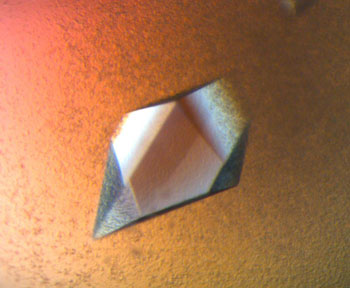| Posted: Mar 10, 2015 |
Non-protein nucleating agent specifically designed for automated protein crystallization trials
|
|
(Nanowerk News) Scientists at Imperial College London and the University of Surrey are developing new nano-materials and technologies that include high-throughput methods for producing nucleating protein crystals that are pivotal to the structural determination of biological molecules at atomic resolution. These underpin rational drug design, the understanding of biochemical mechanisms and other biotechnological applications.
|
 |
| A human macrophage migration inhibitory factor crystal obtained with MIP.
|
|
Their research, recently published in the journal Biological Crystallograhy ("Automating the application of smart materials for protein crystallization"), describes the design, fabrication and validation of the first non protein-nucleating agent made specifically for robotic crystallisation experiments. This molecularly imprinted polymer (MIP) is dubbed as a smart material and is a cost-effective tool for use in both screening and optimisation for scientists in academia and industry.
|
|
The underlying theory is that MIPs imprinted with a protein can improve crystallization of that protein and other proteins of a similar molecular weight. The MIPs based on polyacrylamide are synthesized in the presence of a template molecule in solution and a cross-linker reagent. Removal of the template, the protein of interest, after completion of the cross-linking step leaves behind a polymer shell with "nano cavities" effectively containing a fingerprint of the protein. The protein can then be reintroduced under crystallization conditions and so the polymer acts as a support around which the protein might crystallize. These MIPs are dispensed using commercially available robots and their application bypasses the concerns associated with seeding and solid heterogeneous nucleants. The MIPs are effective in finding new crystallization conditions and in improving crystal quality.
|
|
The research has paved the way to commercialization by Imperial Innovations - leading to a patented product called 'Chayen Reddy MIP' that can be used for the automated screening and optimization of any biomacromolecule. The application of these materials is simple and only 20 nanolitres is sufficient for each trial, providing a potentially potent tool for scientists in academia and industry.
|

